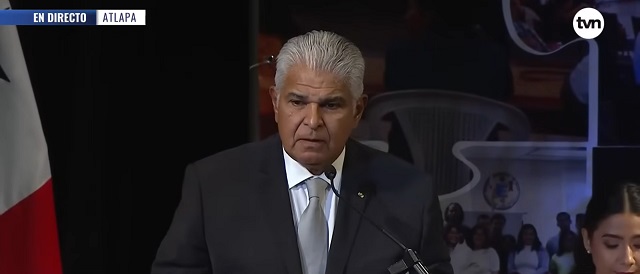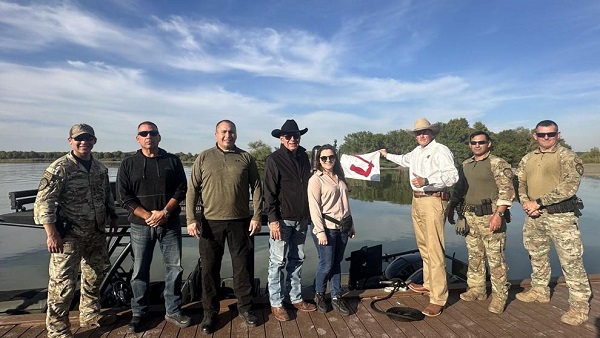illegal immigration
Panama’s Incoming President Wants To Shut Down His Country’s Most Treacherous Route For Migrants — But Will It Work?

 From the Daily Caller News Foundation
From the Daily Caller News Foundation
Panama’s new president-elect is pledging to close a key corridor used by hundreds of thousands of migrants en route to the U.S., but experts and Panamanians aren’t so sure it can be done.
President-elect Jose Raul Mulino handily won the Panamanian presidential election earlier in May, riding a wave of voter discontent over the country’s slow economic growth and an endorsement from a popular former president. The 64-year-old lawyer also campaigned on a pledge to end the illegal immigration that runs through the tiny Central American nation’s Darien gap — but some question the feasibility of that pledge, given the vastness of the jungle, the cartels that populate it and the sheer amount of migrants flowing through it.
“While President Mulino’s promise to close the Darien Gap to migrants appears to be made in good faith, it’s unclear how he could ever actually deliver,” Matt O’Brien, director of investigations for the Immigration Reform Law Institute, said to the Daily Caller News Foundation. “The region consists of thousands of square miles of jungle that are virtually impossible to police.”
“And the gap itself is already home to massive migrant assistance operations that are funded by politically-potent, anti-borders groups from all over the world,” O’Brien added. “None of these organizations are likely to close up shop and go home without a fight.”
The number of illegal immigrants crossing the Darien Gap is incredibly massive — and rising. More than half a million migrants passed through the region in 2023, double the nearly 250,000 that had crossed the year before, according to the Council of Foreign Relations.
“The border of the United States, instead of being in Texas, moved to Panama,” Mulino said on the campaign trail. “We’re going to close the Darien and we’re going to repatriate all these people,” referring to a vast jungle region across Panama and Colombia known as the Darien Gap.
The pledge has received notable coverage from American media, and the Secretary of State’s office made mention of anticipated cooperation on the issue shortly after Mulino’s election victory.
The Darien Gap, however, is roughly 40 miles wide and 100 miles long, with a combination of rainforests and mountains and virtually no government presence, according to the Guardian. Hiking through the region can take days.
The area is also under the de facto authority of drug-trafficking organizations such as the Revolutionary Armed Forces of Colombia (FARC) and the Gulf Clan paramilitary group, according to the Council on Foreign Relations. The groups are known to extort and sexually assault travelers who pass through the region.
The idea of closing off the Darien has long been regarded as too much of a burden to accomplish, given these factors.
“Panama closed their border,” Wisconsin GOP Rep. Tom Tiffany said in 2021 after a trip to the Darien Gap. “But they, in effect, can’t because of the incredible crush of migrants that are coming from all over the world.”
More recently, Juan Pappier, the Americas deputy director at Human Rights Watch, framed Mulino’s promise to close the Darien Gap as “virtually impossible.”
The majority of migrants crossing the Darien Gap are Venezuelan nationals, but people from Ecuador, Haiti and other African and Asian countries also utilize these routes to make it to the U.S. border.
Panamanians have made notice of the enormous flow of migrants crossing their country on a daily basis.
“It’s impossible to not run into a foreigner who is begging for money or puts their child in front of you to beg for money, or sell you chewing gum or candy,” Allan Baitel, a born-and-raised Panamanian citizen, told the DCNF. “We have a lot of individuals who are present on the streets at all times, 24 hours a day with signs asking for help.”
Baitel noted that the government is “doing its best” to mitigate disruptions to daily Panamanian life by getting the migrants off the street and moving them to the border of Costa Rica. While he acknowledged the difficulty in closing up the Darien Gap, he expressed optimism over Mulino’s background.
“It’s going to be very hard to close the gap, very difficult,” he said, noting that Colombia was unlikely to help in the effort. Colombia’s leftist president, Gustavo Petro, has long been hesitant to adopt measures to physically bar migrants from entering the jungle, claiming that a more humanitarian approach should be taken.
“Let me tell you that Mulino’s background is in security,” Baitel said. “He has preparation in having to deal with a lot of these issues, so he may have something up his sleeve.”
Currently, the Panamanian government’s policy has been to immediately bus incoming migrants to the Costa Rican border, allowing them to carry on in their U.S.-bound journey. In a recent radio interview, the incoming president said most would-be migrants would simply not even try to cross Panama once he begins deporting them.
“Because when we start to deport people here in an immediate deportation plan the interest for sneaking through Panama will decrease,” Mulino said in the radio interview. “I assure you they are going to say that going through Panama is not attractive because they are deporting you.”
For many Panamanian citizens, the crisis hasn’t made much of a personal impact on them since the vast majority of the migrants are quickly moving on and out of the country.
“We don’t see that many, no one wants to stay here. They want to get to the shining city on the hill,” said Surse Pierpoint, a third-generation Panamanian who spoke to the DCNF.
Pierpoint said that the topic of immigration doesn’t even crack the “top five” issues that matter to him at the moment. Like many other voters, Pierpoint cited the tough economic times the country has faced and he liked Mulino’s agenda for the private sector.
Panama, once the top performing economy in Latin America, has struggled with credit downgrades, slow economic growth, less foreign direct investment and the closing of a major copper mine. The president-elect campaigned on a pledge to bring life back into the private sector with a pro-market agenda.
As for closing the Darien Gap, Pierpoint has doubts: “I don’t know how he can do that frankly,” he said. “It sounds good, but I don’t see how it’s feasible in the short term.”
While so much attention has been focused on Mulino’s ability to close the migration routes himself, policy experts in Washington, D.C,. and locals in Panama alike also pointed the finger back at the Biden administration. The crisis taking place in this Latin American isthmus, they say, begins and ends at the White House.
“Panama president-elect Jose Mulino’s pledge to close the Darien Gap route that migrants are traversing on their way to the U.S. southern border demonstrates the far-reaching negative consequences of Pres. Biden’s immigration policies,” Eric Ruark, director of research at NumbersUSA, said to the DCNF. “This is a humanitarian crisis entirely of President’ Biden’s making, and Panama is just one of the countries dealing with the fallout.”
“All of this has to do with the United States,” Baitel added. “It will not cease until there’s a very drastic change in the United States.”
illegal immigration
US Notes 2.5 million illegals out and counting

President Trump’s Department of Homeland Security is marking what officials are calling a landmark moment in U.S. immigration enforcement, announcing Wednesday that more than 2.5 million illegal aliens have now left the country since Trump returned to the Oval Office in January. DHS Secretary Kristi Noem said the surge reflects a sweeping, sustained crackdown driven by Immigration and Customs Enforcement teams that — according to internal tallies — have already removed more than 605,000 illegal aliens, most of whom were facing criminal charges or carrying prior convictions. Nearly two million more have opted to self-deport, a wave Noem attributes to stepped-up enforcement and the administration’s aggressive public messaging. She again urged those still in the country illegally to use the government’s CBP Home app, which offers a free one-way flight and a $1,000 stipend to expedite departure.
Senior DHS officials say arrests have climbed as well, with almost 600,000 illegal aliens taken into custody since January 20. “Illegal aliens are hearing our message to leave now,” DHS official McLaughlin said this week. “They know if they don’t, we will find them, we will arrest them, and they will never return.”
The administration argues the impact is being felt far beyond immigration courts and detention facilities, pointing to the U.S. housing market as one of the clearest signs of change. For six straight months, DHS says not a single illegal alien has been released into the interior from the southern border — a dramatic shift after years of mass inflows under President Biden. That decline, they say, is finally filtering into rent and home-price data after years of punishing increases.
Housing and Urban Development Secretary Scott Turner said Americans have now seen four consecutive months of rent decreases — the first sustained drop in years — as fewer illegal aliens compete for housing. Vice President JD Vance emphasized the connection even more bluntly: “The connection between illegal immigration and skyrocketing housing costs is as clear as day. We are proud to be moving in the right direction. Still so much to do.”
Research abroad and at home backs up the administration’s argument. Economists in Denmark released findings earlier this year showing that a one-percentage-point rise in local immigration over a five-year period drove private rental prices up roughly 6 percent and home prices up about 11 percent. The Center for Immigration Studies presented similar data to Congress last year, with researcher Steven Camarota testifying that a 5-percentage-point increase in a metro area’s recent-immigrant share was tied to a 12-percent rise in rent for U.S.-born households.
As DHS leaders frame it, Trump’s second-term enforcement machine is reshaping both border policy and household budgets — an approach they say is finally delivering relief to Americans who spent years squeezed by soaring housing costs and unchecked migration.
illegal immigration
EXCLUSIVE: Canadian groups, First Nation police support stronger border security

First Nation police chiefs join Texas Department of Public Safety marine units to patrol the Rio Grande River in Hidalgo County, Texas. L-R: Dwayne Zacharie, President of the First Nations Chiefs of Police Association, Ranatiiostha Swamp, Chief of Police of the Akwesasne Mohawk Territory, Brooks County Sheriff Benny Martinez, Jamie Tronnes, Center for North American Prosperity and Security, Goliad County Sheriff Roy Boyd. Photo: Bethany Blankley for The Center Square
From The Center Square
By
Despite Canadian officials arguing that the “Canada-U.S. border is the best-managed and most secure border in the world,” some Canadian groups and First Nation tribal police chiefs disagree.
This week, First Nation representatives traveled to Texas for the first time in U.S.-Canadian history to find ways to implement stronger border security measures at the U.S.-Canada border, including joining an Operation Lone Start Task Force, The Center Square exclusively reported.
Part of the problem is getting law enforcement, elected officials and the general public to understand the reality that Mexican cartels and transnational criminal organizations are operating in Canada; another stems from Trudeau administration visa policies, they argue.
When it comes to public perception, “If you tell Canadians we have a cartel problem, they’ll laugh at you. They don’t believe it. If you tell them we have a gang problem, they will absolutely agree with you 100%. They don’t think that gangs and cartels are the same thing. They don’t see the Hells Angels as equal to the Sinaloa Cartel because” the biker gang is visible, wearing vests out on the streets and cartel operatives aren’t, Jamie Tronnes, executive director of the Center of North American Prosperity and Security, told The Center Square in an exclusive interview.
The center is a US-based project of the MacDonald-Laurier Institute, the largest think tank in Canada. Tronnes previously served as a special assistant to the cabinet minister responsible for immigration and has a background in counterterrorism. She joined First Nation police chiefs to meet with Texas law enforcement and officials this week.
Another Canadian group, Future Borders Coalition, argues, “Canada has become a critical hub for transnational organized crime, with networks operating through its ports, banks, and border communities.” The Sinaloa and Jalisco New Generation Mexican cartels control the fentanyl, methamphetamine and cocaine business in Canada, partnering with local gangs like the Hells Angels and Chinese Communist Party (CCP)-linked actors, who launder profits through casinos, real estate, and shell companies in Vancouver and Toronto, Ammon Blair, a senior fellow at the Texas Public Policy Foundation, and others said at a coalition event prior to First Nation police chiefs and Tronnes coming to Texas.
“The ’Ndrangheta (Italian Mafia) maintains powerful laundering and import operations in Ontario and Quebec, while MS-13 and similar Central American gangs facilitate human smuggling and enforcement. Financial networks tied to Hezbollah and other Middle Eastern groups support laundering and logistics for these criminal alliances,” the coalition reports.
“Together, they form interconnected, technology-driven enterprises that exploit global shipping, cryptocurrency, and AI-enabled communications to traffic whatever yields profit – narcotics, weapons, tobacco, or people. Taking advantage of Canada’s lenient disclosure laws, fragmented jurisdictions, and weak cross-border coordination, these groups have embedded themselves within legitimate sectors, turning Canada into both a transit corridor and safe haven for organized crime,” the coalition reports.
Some First Nation reservations impacted by transnational crime straddle the U.S.-Canada border. One is the Akwesasne Mohawk Reservation, located in Ontario, Quebec, and in two upstate New York counties, where human smuggling and transnational crime is occurring, The Center Square reported. Another is the Tsawwassen First Nation (TWA) Reservation, located in a coastal region south of Vancouver in British Columbia stretching to Point Roberts in Washington state, which operates a ferry along a major smuggling corridor.
Some First Nation reservations like the TWA are suffering from CCP organized crime, Tronnes said. Coastal residents observe smugglers crossing their back yards, going through the reserve; along Canada’s western border, “a lot of fentanyl is being sent out to Asia but it’s also being made in Canada,” Tronnes said.
Transnational criminal activity went largely unchecked under the Trudeau government, during which “border security, national security and national defense were not primary concerns,” Tronnes told The Center Square. “It’s not to say they weren’t concerns, but they weren’t top of mind concerns. The Trudeau government preferred to focus on things like climate change, international human rights issues, a feminist foreign policy type of situation where they were looking more at virtue signaling rather than securing the country.”
Under the Trudeau administration, the greatest number of illegal border crossers, including Canadians, and the greatest number of known, suspected terrorists (KSTs) were reported at the U.S.-Canada border in U.S. history, The Center Square first reported. They include an Iranian with terrorist ties living in Canada and a Canadian woman who tried to poison President Donald Trump, The Center Square reported.
“Had it been a priority for the government to really crack down and provide resources for national security,” federal, provincial and First Nation law enforcement would be better equipped, funded and staffed, Tronnes said. “They would have better ways to understand what’s really happening at the border.”
In February, President Donald Trump for the first time in U.S. history declared a national emergency at the northern border and ordered U.S. military intervention. Months later, his administration acknowledged the majority of fentanyl and KSTs were coming from Canada, The Center Square reported.
Under a new government and in response to pressure from Trump, Canada proposed a $1.3 billion border plan. However, more is needed, the groups argue, including modernizing border technology and an analytics infrastructure, reforming disclosure and privacy rules to enable intelligence sharing, and recognizing and fully funding First Nation police, designating them as essential services and essential to border security.
“National security doesn’t exist without First Nation policing at the border,” Dwayne Zacharie, First Nations Chiefs of Police president, told The Center Square.
-

 Energy1 day ago
Energy1 day agoCanada’s future prosperity runs through the northwest coast
-

 Business2 days ago
Business2 days agoThe world is no longer buying a transition to “something else” without defining what that is
-

 Fly Straight - John Ivison2 days ago
Fly Straight - John Ivison2 days agoMPs who cross the floor are dishonourable members
-

 Business17 hours ago
Business17 hours agoFuelled by federalism—America’s economically freest states come out on top
-

 illegal immigration1 day ago
illegal immigration1 day agoUS Notes 2.5 million illegals out and counting
-

 illegal immigration2 days ago
illegal immigration2 days agoEXCLUSIVE: Canadian groups, First Nation police support stronger border security
-

 Business2 days ago
Business2 days agoBrutal economic numbers need more course corrections from Ottawa
-

 Daily Caller16 hours ago
Daily Caller16 hours ago‘There Will Be Very Serious Retaliation’: Two American Servicemen, Interpreter Killed In Syrian Attack




